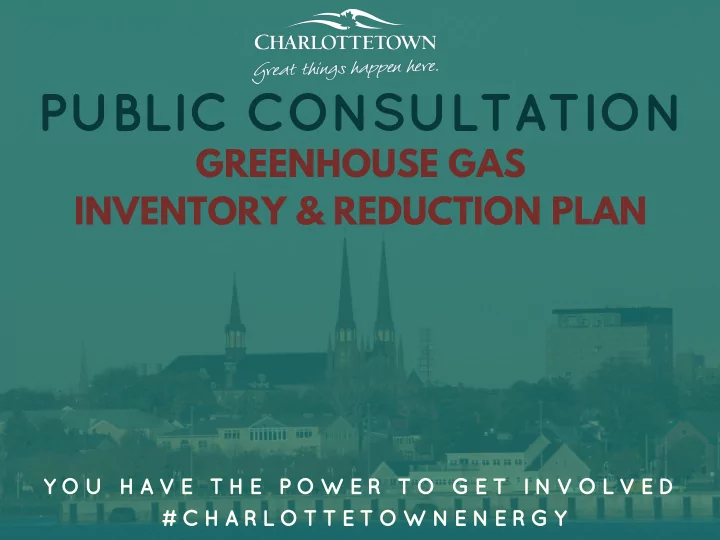

PUBLIC CONSULTATION GREENHOUSE GAS INVENTORY & REDUCTION PLAN Y O U H A V E T H E P O W E R T O G E T I N V O L V E D # C H A R L O T T E T O W N E N E R G Y
WELCOME! The City of Charlottetown is developing a plan to reduce Greenhouse Gas (GHG) emissions across all sectors. We've created our GHG inventory, and now it's time to reflect upon our current emissions profile, and work together to create a shared vision for the future. # C H A R L O T T E T O W N E N E R G Y
HOW WE GOT HERE Funding & In-Kind Support $99,900 from MCIP $5,000 from efficiencyPEI $1,500 from Maritime Electric $18,500 from the City of Charlottetown Total Budget: $124,900 The Municipalities for Climate Innovation Program (MCIP) is a five-year, $75-million program that helps municipalities prepare for, and adapt to, climate change, and to reduce emissions of greenhouse gases (GHGs).
PROJECT PHASES COMMUNITY PUBLIC EVALUATE DRAFT GHG ADOPT GHG GHG CONSULTATIONS PROPOSED REDUCTION REDUCTION INVENTORY MEASURES PLAN PLAN & IN PROGRESS IMPLEMENT COMPLETE ACTIONS loading...
CLIMATE CHANGE & GHG'S
LOCAL EFFORT GLOBAL ISSUE
CURRENT EMISSIONS PROVINCIAL - PEI 2015: ~1.8 MT CO2e in PEI's GHG Inventory ~2.3 MT CO2e/Year Including GHGs of Electricity Use ~15.5 tCO2 Per Capita vs ~12.1 tCO2e Per Person Per Year
CHARLOTTETOWN SECONDARY ENERGY USE PERSPECTIVE: CHARLOTTETOWN’S AVE ALL-SECTOR POWER DEMAND: ~170 MW PEI’S AVE ALL-SECTOR DEMAND: ~815 MW CITY ~25% OF PEI'S POPULATION & ~21% OF ENERGY USE IN INVENTORY
CHARLOTTETOWN GHG EMISSIONS 426,729 Tonnes CO2e 11.47 Tonnes Per Capita
RESIDENTIAL GHGS 108,936 Tonnes CO2e 6.8 tCO2e Per Average Household
COMMERCIAL & INSTITUTIONAL GHGS 161,000 Tonnes CO2e
INDUSTRIAL GHGS 35,268 Tonnes CO2e
ONROAD TRANSPORT GHGS 100,051 Tonnes CO2e 3.9 tCO2e Per Average Light-Duty Vehicle
NON-ROAD TRANSPORTATION GHGS Aviation Transport GHGs 14,886 tCO2e (Revision: 1/19/2018) Marine Transport GHGs 283 tCO2e Offroad Transport GHGs 71 tCO2e Note - Revisions will soon be reflected in an updated energy/GHG inventory, and a supplementary info section will became available.
WASTE & AGRICULTURE GHGS Waste GHGs 6,400 tCO2e Agriculture GHGs 170 tCO2e Enteric Fermentation 140 tCO2e Manure Management 30 tCO2e
WHY BLACK CARBON MATTERS 24,000 Tonnes of CO2e 0.65 tCO2e Per Capita Our estimates suggest about half or more of all black carbon particles emitted may occur from burning of diesel fuel. Reducing black carbon emissions one fastest ways to slow global warming
DARK ICE IN GREENLAND Black carbon emissions result in deposition on snow. Photo of impurity-rich ice in south Greenland sheet. Buildup of black carbon particles here cause the ice to absorb up to 80 % of the sun's energy and radiate heat instead of reflecting 85-90 % of sunlight back into space.
SUMMARY GHGs: 426,729 tCO2e Black Carbon Particle Emissions: 24,000 tCO2e Total Tonnes CO2e 450,729 tCO2e 11.47 to 12.12 tCO2e Per Capita in City (excluding or including back carbon) 15.53 tCO2e Per Capita Provincially Urban and Rural Areas Differ Can and Do Benefit from Each Other
" The whole is greater than the sum of its parts "
URBAN ENVIRO DENSITY SUSTAINABLE TRANSPORTATION DISTRICT HEAT 26% COMMERCIAL SECTOR SAVINGS SMALL INDUSTRIAL SECTOR less GHG emissions per POPULATION capita than province of PEI # C H A R L O T T E T O W N E N E R G Y
GREENHOUSE GAS REDUCTION PLAN REQUIRES COMMITMENT FROM ALL LEVELS OF GOVERNMENT & SOCIETY NECESSARY TO MITIGATE EFFECTS OF CLIMATE CHANGE ENHANCE RESILIENCE OPPORTUNITY TO LEAD AND INNOVATE # C H A R L O T T E T O W N E N E R G Y
CONSULTATION PACKAGE DOTMOCRACY HISTORICAL ENERGY TIMELINE DISCUSSION GROUPS # C H A R L O T T E T O W N E N E R G Y
TOPICS TRANSPORTATION RENEWABLES ENERGY EFFICIENCY COMMUNITY DEVELOPMENT # C H A R L O T T E T O W N E N E R G Y
THANK YOU
Recommend
More recommend